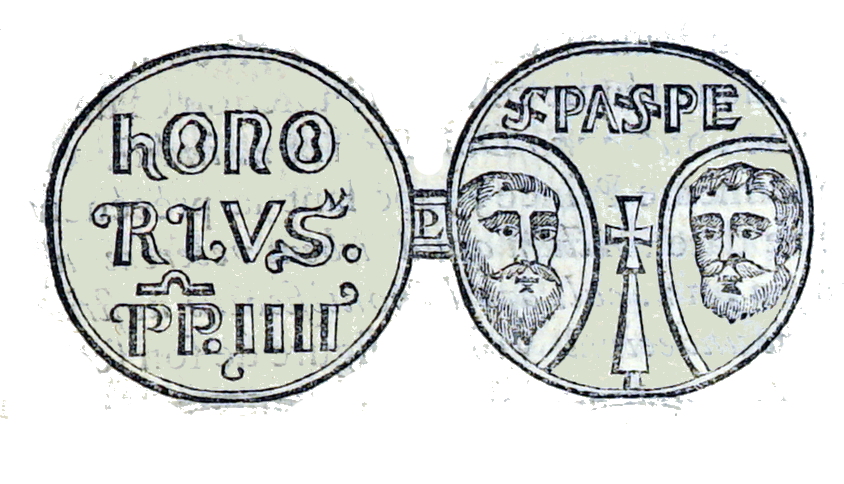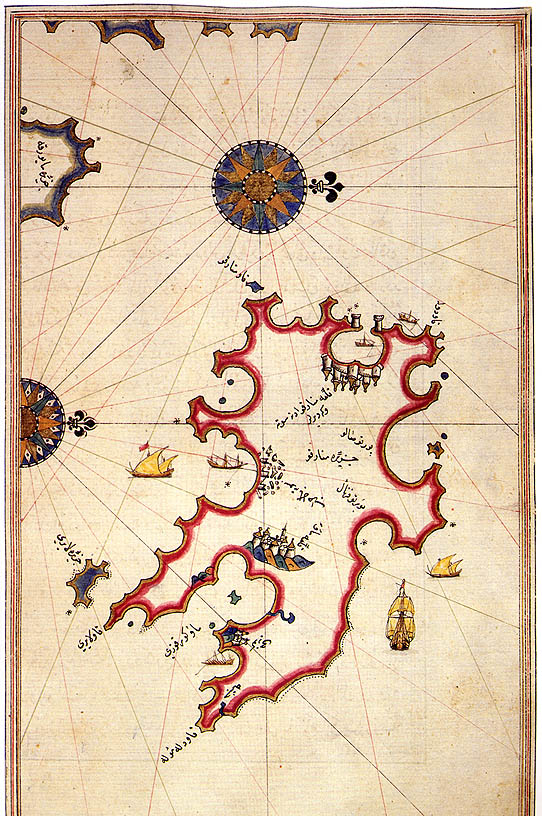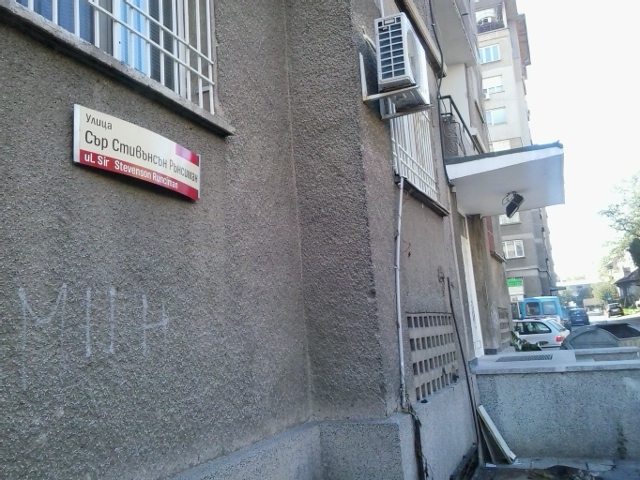|
1287
Year 1287 (Roman numerals, MCCLXXXVII) was a common year starting on Wednesday (link will display the full calendar) of the Julian calendar. Events By place Europe * January 17 – Aragonese forces led by King Alfonso III of Aragon, Alfonso III (the Liberal) conquer the island of Menorca. He signs the "Treaty of San Agayz" with Sultan Abû 'Umar ibn Sa'îd on January 21. Alfonso accepts a policy of free trade for merchants and their property. He also concludes an alliance against the Marinids with Abu Said Uthman I, ruler of the Zayyanid Kingdom of Tlemcen (modern Algeria). He proposes to supply him with five to ten galleys (with food and other goods) in exchange for 500 elite Zayyanid horsemen. * Alfonso III (the Liberal) is forced to make concessions to the nobility after an aristocratic uprising (called the Union of Aragon). In particular, he grants his barons a "Bill of Rights", known as the ''Privilegium Generale''. This leaves a heritage of disunity and furthe ... [...More Info...] [...Related Items...] OR: [Wikipedia] [Google] [Baidu] |
Pope Honorius IV
Pope Honorius IV (c. 1210 – 3 April 1287), born Giacomo Savelli, was head of the Catholic Church and ruler of the Papal States from 2 April 1285 to his death in 1287. During his pontificate he largely continued to pursue the pro-French political policy of his predecessor, Martin IV. Early career Giacomo Savelli was born in Rome into the rich and influential family of the Savelli. His father was Luca Savelli, who died as Senator of Rome in 1266. His mother Joanna belonged to the Aldobrandeschi family. He studied at the University of Paris, and held a prebend and a canonry at the cathedral of Châlons-sur-Marne. Later he obtained the benefice of rector at the church of Berton in the Diocese of Norwich in England, a nation he never visited. In 1261 he was created Cardinal Deacon of Santa Maria in Cosmedin by Pope Urban IV, who also appointed him papal prefect in Tuscany and captain of the papal army. Cardinal Savelli pursued a diplomatic career. Pope Clement IV sent him and ... [...More Info...] [...Related Items...] OR: [Wikipedia] [Google] [Baidu] |
Rabban Bar Sauma
Rabban Bar Ṣawma (Syriac language: , ; 1220January 1294), also known as Rabban Ṣawma or Rabban ÇaumaMantran, p. 298 (), was a Turkic Chinese ( Uyghur or possibly Ongud) monk turned diplomat of the "Nestorian" Church of the East in China. He is known for embarking on a pilgrimage from Yuan China to Jerusalem with one of his students, Rabban Markos. Due to military unrest along the way, they never reached their destination, but instead spent many years in Ilkhanate-controlled Baghdad. The younger Markos was eventually elected Yahballaha III, Patriarch of the Church of the East and later suggested his teacher Rabban Bar Ṣawma be sent on another mission, as Mongol ambassador to Europe. The elderly monk met with many of the European monarchs, as well as the Pope, in attempts to arrange a Franco-Mongol alliance. The mission bore no fruit, but in his later years in Baghdad, Rabban Bar Ṣawma documented his lifetime of travel. His written account of his journeys is of unique i ... [...More Info...] [...Related Items...] OR: [Wikipedia] [Google] [Baidu] |
Battle Of The Counts
The naval Battle of the Counts took place on 23 June 1287 at Naples, Italy, when an Aragonese- Sicilian galley fleet commanded by Roger of Lauria defeated a large combined Angevin (Kingdom of Naples) galley fleet commanded respectively by Reynald III Quarrel of Avella and Narjot de Toucy. Lauria had taken his fleet to Augusta, eastern Sicily, after a report of an Angevin galley fleet landing invasion troops there. He landed his troops, who recaptured the town, leaving the Angevins holed up in the castle. However, the invasion was a decoy and the Angevin galleys had sailed around the south of Sicily and linked up with their allies, forming a fleet about twice the size of Lauria's. Their plan was to land troops in the south-west of Sicily. Lauria searched for the allied fleet and finally found it at Naples. Unable to attack it close to the city, he bombarded the nearby coast to lure it out, as he had done in 1284, and sent in a formal challenge. The Angevin fleet came out arra ... [...More Info...] [...Related Items...] OR: [Wikipedia] [Google] [Baidu] |
Abû 'Umar Ibn Sa'îd
Abû ‘Umar ibn Sa’îd ( ar, أبو عمر بن سعيد) (died c. 1287) was son of Abû 'Uthmân Sa'îd ibn Hakam al Qurashi and last ra’îs of Manûrqa (1282–1287). In his first year in government, King Peter III of Aragon and his fleet stopped by Manurqa on their way to the city of Constantine (North Africa). Bugron, the Lord of Constantine, had secretly plotted with Peter to convert to Christianity and surrender the city to the Crown of Aragon. According to Ramon Muntaner’s ''Cronica'', Abû ‘Umar sent messengers to North Africa letting know of this plot. The consequences were that Bugron was executed and Peter’s surprise invasion was discovered. Years later, Peter and King James II of Majorca, (Menorca’s vassal lord) came into a dispute. Peter’s son King Alfons III of Aragon set out from Salou on 22 November 1286 with an invasion force against Manûrqa. This was both to avenge Abû ‘Umar ibn Sa’îd and James II. He arrived on 5 January 1287. Abû ... [...More Info...] [...Related Items...] OR: [Wikipedia] [Google] [Baidu] |
Menorca
Menorca or Minorca (from la, Insula Minor, , smaller island, later ''Minorica'') is one of the Balearic Islands located in the Mediterranean Sea belonging to Spain. Its name derives from its size, contrasting it with nearby Majorca. Its capital is Mahón ( ca, Maó), situated on the island's eastern end, although Menorca is not a province and forms a political union with the other islands in the archipelago. Ciutadella and Mahon are the main ports and largest towns. The port of Mahon is the second biggest natural port in the world. Menorca has a population of approximately 93,397 (at 1 January 2019). It is located 39°47' to 40°00'N, 3°52' to 4°24'E. Its highest point, called El Toro (from Catalan "''turó''" meaning ''hill''), is above sea level. History The island is known for its collection of megalithic stone monuments: ''navetes'', ''taules'' and ''talaiots'', which indicate very early prehistoric human activity. Some of the earliest culture on Menorca was ... [...More Info...] [...Related Items...] OR: [Wikipedia] [Google] [Baidu] |
Union Of Aragon
The Union of Aragon ( Castilian: ''Unión de Aragón'') or "Union of the Nobles" was an anti-royalist movement among the nobility and the townsmen of the lands of the Crown of Aragon during the last quarter of the thirteenth century. Its efforts culminated in a series of articles confirming the privileges of the aristocracy and the cities and proscribing the power of the monarchy known as the ''Magna Carta of Aragon''. The Union had its origin in the nature of the Crown of Aragon, incorporating various kingdoms at various times. The various lands vied for the attention of the monarch and struggled to protect their privileges and their influence against the rise of any other. At the same time, King Peter III was conquering Sicily and his Spanish dominions were neglected. Eventually, Pope Martin IV called a crusade, the Aragonese Crusade, against Peter and his kingdom, dissolving his subjects of their oaths of fealty. Peter had to exact heavy taxes in order to finance resistance to t ... [...More Info...] [...Related Items...] OR: [Wikipedia] [Google] [Baidu] |
Alfonso III Of Aragon
Alfonso III (4 November 1265, in Valencia – 18 June 1291), called the Liberal (''el Liberal'') or the Free (also "the Frank," from ''el Franc''), was the king of Aragon and Valencia, count of Roussillon, Cerdanya and Barcelona (as ) from 1285. He conquered the Kingdom of Majorca between his succession and 1287. He was a son of King Peter III of Aragon and Constance, daughter and heiress of King Manfred of Sicily. Soon after assuming the throne, he conducted a campaign to reincorporate the Balearic Islands into the Kingdom of Aragon – which had been lost due to the division of the kingdom by his grandfather, James I of Aragon. Thus in 1285 he declared war on his uncle, James II of Majorca, and conquered both Majorca (1285) and Ibiza (1286), effectively reassuming suzerainty over the Kingdom of Majorca. He followed this with the conquest of Menorca – until then, an autonomous Muslim state (Manûrqa) within the Kingdom of Majorca – on 17 January 12 ... [...More Info...] [...Related Items...] OR: [Wikipedia] [Google] [Baidu] |
Abu Said Uthman I
Abu Said Uthman I (), or "Othmane Ibn Yaghmoracen", or in Algerian arabic ( أبو سعيد عثمان الأول, Abu Sa'id Othman āl-awel), ruled the Zenata Berber Kingdom of Tlemcen in Medieval Algeria from 1283 to 1303. Biography Abu Said Uthman I succeeded his father Abu Yahya Yaghmurasen ibn Zayyan (1236–1282) as ruler of the Zayyanid dynasty. He was the pearl of perfection, lord of (diverse) fractions of the Abd el-Wad family. He was the bravest and one of the most fearsome warriors of his tribe He annexed to his empire the countries of his enemies and defended the lands of his subjects. His empire was luxurious and the cities were said to have been well administrated. Through marriages with the Hafsids, he was able to establish good relations with his eastern neighbors. This allowed Uthman I to withstand the ongoing attacks of the Marinids of Fez. The fighting led to devastating results in his Empire. The siege of Tlemcen by the Marinids was maintained from 1299 to 1 ... [...More Info...] [...Related Items...] OR: [Wikipedia] [Google] [Baidu] |
Philip IV Of France
Philip IV (April–June 1268 – 29 November 1314), called Philip the Fair (french: Philippe le Bel), was King of France from 1285 to 1314. By virtue of his marriage with Joan I of Navarre, he was also King of Navarre as Philip I from 1284 to 1305, as well as Count of Champagne. Although Philip was known to be handsome, hence the epithet ''le Bel'', his rigid, autocratic, imposing, and inflexible personality gained him (from friend and foe alike) other nicknames, such as the Iron King (french: le Roi de fer, link=no). His fierce opponent Bernard Saisset, bishop of Pamiers, said of him: "He is neither man nor beast. He is a statue." Philip, seeking to reduce the wealth and power of the nobility and clergy, relied instead on skillful civil servants, such as Guillaume de Nogaret and Enguerrand de Marigny, to govern the kingdom. The king, who sought an uncontested monarchy, compelled his upstart vassals by wars and restricted their feudal privileges, paving the way for the t ... [...More Info...] [...Related Items...] OR: [Wikipedia] [Google] [Baidu] |
Roger Of Lauria
Roger of Lauria (''c''. 1245 – 17 January 1305) was a Neapolitan admiral in Aragonese service, who was the commander of the fleet of the Crown of Aragon during the War of the Sicilian Vespers. He was probably the most successful and talented naval tactician of the Middle Ages. He is known as Ruggero or Ruggiero di Lauria in Italian and Roger de Llúria in Catalan language, Catalan. Biography Roger of Lauria was born at Lauria or Scalea in what is now southern Italy, the son of Richard of Lauria, Great Justiciar of the Kingdom of Sicily, and Bella d'Amichi, Donna Bella, a nurse of Constance of Sicily, Queen of Aragon, Constance of Sicily. His father had served under King Manfred of Sicily, a Hohenstaufen; when the last member of that family, Conradin of Swabia, was beheaded at Naples in 1268, he took refuge with other Guelphs and Ghibellines, Ghibelline exiles at Barcelona, part of the Crown of Aragón with his mother. Later King Peter III of Aragon, who had married Constan ... [...More Info...] [...Related Items...] OR: [Wikipedia] [Google] [Baidu] |
Steven Runciman
Sir James Cochran Stevenson Runciman ( – ), known as Steven Runciman, was an English historian best known for his three-volume ''A History of the Crusades'' (1951–54). He was a strong admirer of the Byzantine Empire. His history's negative portrayal of crusaders and contrasting more favourable view of Byzantine and Muslim societies had a profound impact on the popular conception of the Crusades. Biography Born in Northumberland, he was the second son of Walter and Hilda Runciman. His parents were members of the Liberal Party and the first married couple to sit simultaneously in Parliament. His father was created Viscount Runciman of Doxford in 1937. His paternal grandfather, Walter Runciman, 1st Baron Runciman, was a shipping magnate. He was named after his maternal grandfather, James Cochran Stevenson, the MP for South Shields. Eton and Cambridge It is said that he was reading Latin and Greek by the age of five. In the course of his long life he would master an astonish ... [...More Info...] [...Related Items...] OR: [Wikipedia] [Google] [Baidu] |
James II Of Majorca
James II ( ca, Jaume) (31 May 1243 – 29 May 1311) was King of Majorca and Lord of Montpellier from 1276 until his death. He was the second son of James I of Aragon and his wife, Violant, daughter of Andrew II of Hungary. In 1279, by the Treaty of Perpignan, he became a vassal of the Crown of Aragon. Biography James inherited from his father a realm including three of the Balearic Islands (Majorca, Ibiza, and Formentera), the counties of Roussillon and Cerdanya, the dominion of Montpellier, the barony of Aumelàs, and the viscounty of Carladès. He also gained tribute from the fourth Balearic island, Menorca, which remained under Muslim control throughout his life. He ruled as a vassal of his brother Peter III of Aragon, a subordinate status which he sought to escape. In 1276, his former seneschal, Ramon Llull persuaded James to fund a language school for Franciscan missionaries at Miramar. France and Aragon contested for control of Sicily. James held rights over borderla ... [...More Info...] [...Related Items...] OR: [Wikipedia] [Google] [Baidu] |




